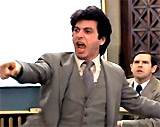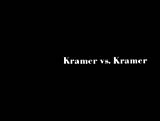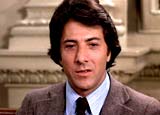
|
|
(chronological by film title) Introduction | 1920s-1930s | 1940s | 1950s | 1960s | 1970s | 1980s | 1990s | 2000s | 2010s |
(chronological by title) |
||
| Film Title/Year/Director/Length/Studio, Academy Awards, Brief Description | ||

|
10 Rillington Place (1971, UK) This was an exceptional biographical crime drama - a treatise against capital punishment - with a tagline which asked the question: "What happened to the women at 10 Rillington Place?" The story, set in London in 1949, was about a monstrous, psychopathic British serial killer named John Reginald Christie (Richard Attenborough). It first went back a few years in time to show how the notorious, soft-spoken Christie lured his female victims by impersonating a medical expert. He would knock them out (with gas), strangle and rape them, and then hide their corpses in his home or bury them in his garden. Then, it told about new tenants, dim-witted and illiterate Tim (John Hurt) and pregnant wife Beryl Evans (Judy Geeson) with a newborn named Geraldine, who rented rooms above apt. manager Christie's row-house apartment. Christie took advantage of the indigent and pregnant Beryl, who was desperate for an abortion ("termination"), with the help of his complicit wife Ethel (Pat Heywood). During the 'operation,' he raped and murdered Beryl, then framed the killing on Tim (who was convinced to flee by train), and also strangled the baby. When Tim was apprehended by police, he unaccountably confessed to both murders (with three signed confessions), without pressure or coercion - and he was charged with the killings. Verdict: During the trial, a complete miscarriage of justice, there was powerful circumstantial evidence against Tim (he had approved his wife's abortion), while Christie denied any involvement (although evidence of his prior crimes of violence and theft demonstrated his lack of credibility). Most damning, Tim couldn't explain why he had confessed to a crime he didn't commit, and he was blamed for the killings. As an innocent man, he was unjustly sentenced to death, and although it was ruled that he was mentally incompetent, he was hanged in 1949. A few years later, graphic evidence surfaced that Christie was still murdering women (including his wife Ethel) and hiding bodies in his apartment. He was deemed responsible for the Evans' family killings. After Christie's trial, he was hanged to death in 1953. In the 1960s, Tim was given a posthumous official pardon (but his conviction remained on the books), and he was reburied. |

|

|
...And Justice For All (1979) This blockbuster hit was a satirical, outrageous, lampooning take on the criminal justice system. Idealistic, hot-headed criminal defense attorney Arthur Kirkland (Al Pacino) in Baltimore, MD was called upon to defend by-the-book Judge Henry T. Fleming (John Forsythe), his arch nemesis. Earlier, the Judge had wrongly sentenced and imprisoned Kirkland's criminally-convicted client Jeff McCullaugh (Thomas G. Waites) because of a technicality (Kirkland had filed a motion to reopen the case three days late). Kirkland was also jailed on contempt charges. At the same time, Kirkland was facing the bar's disciplinary committee on ethics charges, while sleeping with Gale Packer (Christine Lahti), a member of the committee. And other problems were occurring: Kirkland's law partner Jay Porter (Jeffrey Tambor) was experiencing a nervous breakdown over some bad judicial decisions, while another of Kirkland's clients - transgendered Ralph Agee (Robert Christian) - committed suicide by hanging after the mishandling of his case. Kirkland was shocked to be forced to represent the Judge when the venerable man was charged with brutal assault and rape charges. (The Judge used blackmail to coerce Kirkland to defend him, by threatening to disclose a serious ethics violation years earlier - a violation of lawyer-client confidentiality. The Judge also promised to reopen the McCullaugh case if Kirkland accepted the case.) During the lengthy proceedings before trial, McCullaugh was repeatedly raped in prison, and eventually retaliated by grabbing a gun and taking two hostages - before he was killed by snipers. The Judge's case was presided over by Judge Francis Rayford (Jack Warden), while the prosecuting attorney was Frank Bowers (Craig T. Nelson). Verdict: In private, the Judge (after being presented with photographs showing him engaged in S&M with a prostitute), admitted to Kirkland that he was guilty. However, he was able to pass a polygraph test. Incensed by his client's callous attitude (the Judge had casually said he would like to see the "attractive" rape victim again, and he had paid a witness to testify in his favor), it appeared that Kirkland was properly defending his client with his opening statement, but then turned on him with tremendous rage, condemning him for abusing law and order and calling the loathsome judge guilty: "My client, the Honorable Henry T. Fleming, should go right to f--kin' jail! The son of a bitch is guilty! That man is guilty! That man there, that man is a slime! He is a slime! If he's allowed to go free, then something really wrong is goin' on here!..." When Judge Rayford ruled that Kirkland was out of order, he retorted: "You're out of order! You're out of order! The whole trial is out of order! They're out of order! That man, that sick, crazy depraved man raped and beat that woman there, and he'd like to do it again! He told me so!" In the final scene, Kirkland was sitting on the courthouse steps, wondering about his career's future. |

|

|
Kramer vs. Kramer (1979) Robert Benton's sensitive, tear-jerking Best Picture-winning marital drama was about a dysfunctional yuppie family. Ted Kramer (Dustin Hoffman), a workaholic NYC ad executive, suffered an abrupt break-up with unfulfilled, bored and depressed wife Joanna (Meryl Streep). The emotionally-unstable Joanna walked out on him, stating that she was unhappy and needed to find herself. Suddenly, he was propelled into the uncomfortable paternal role of single dad with young 6 year-old son Billy (Justin Henry), needing to take on a nurturing gender role, and balancing demanding career obligations with parenthood (which ultimately meant that Ted was fired from his demanding ad job, but found other less profitable work). However, he was able to establish a very close bond with Billy. But then, about 15 months later, estranged ex-wife Joanna unexpectedly returned to take their son away with her, setting up a nasty child-custody battle in the court. The presiding judge was Judge Atkins (Howland Chamberlain). Verdict: During her testimony, Joanna argued that she had now regained her self-esteem, was earning a decent salary, and had taken a steady lover. Ted's friend, neighbor and soul-mate Margaret (Jane Alexander) testified that Ted made a great father, although she admitted that she had counseled Joanna to leave if she was unhappy. Ted made an eloquent and heart-felt court plea - defending his right to have custody of his son over Joanna, and his admission that he was not a perfect parent: "My wife, my ex-wife, says that she loves Billy, and I believe she does, but I don't think that's the issue here. If I understand it correctly, what means the most here is what's best for our son. What's best for Billy...Billy has a home with me. I've made it the best I could. It's not perfect. I'm not a perfect parent. Sometimes I don't have enough patience because I forget that he's a little kid. But I'm there. We get up in the morning and then we eat breakfast, and he talks to me and then we go to school. And at night, we have dinner together and we talk then and I read to him. And, and we built a life together and we love each other. If you destroy that, it may be irreparable. Joanna, don't do that, please. Don't do it twice to him." However, the Judge ruled in favor of mother Joanna - Ted lost custody, had to pay child support, and was granted limited visitation rights. In the film's unexpected concluding scene, Joanna met with the persevering Ted after winning custody and was about to take Billy away. But then, she backed down with a sudden change of heart when she realized father-and-son's close bond. She decided that Billy should remain with him in his true home. |

|

|
The Onion Field (1979) This crime drama was about the prolonged miscarriage of justice. It was based on a true series of incidents, recounted in LAPD Sergeant Joseph Wambaugh's 1973 book. It told about the 1963 kidnapping of two plainclothes officers in an unmarked car in Hollywood by two known criminals, ending in the death of Officer Ian James Campbell (in an 'onion field' near Bakersfield, CA). The film followed the events of the true-case and the book fairly faithfully -- two LA detectives (both married): inexperienced Karl Hettinger (John Savage) and veteran cop Ian Campbell (Ted Danson in his debut film) were kidnapped by criminals Greg Powell (James Woods) and Jimmy Smith (aka "Jimmy Youngblood") (Franklyn Seales) in Hollywood. They were driven to an onion field near Bakersfield, where Campbell was shot and killed (after being shot initially, he was also shot 4 times in the chest while on the ground), while Hettinger managed to escape into the darkness. After Powell was apprehended by police and interrogated by Sgt. Pierce Brooks (Ronny Cox), he blamed partner Smith for the murder. Smith was arrested, who then blamed Powell for the crime. Both were charged with first-degree murder. Verdict: Due to the physical and emotional stress of the case, and the multiple times that he had to defend his actions (and face criticism and tormenting guilt for Campbell's death) and relive the past, Officer Hettinger suffered depression and a nervous breakdown and was forced to resign. His symptoms included suicidal thoughts, impotence, petty shoplifting, weight loss, and nightmares - he eventually recovered. Meanwhile, the two suspects were tried together, convicted by Hettinger's eye-witness testimony, and sentenced to death row. However, the California Supreme Court reversed the conviction, arguing, in part, that the two should have been tried separately. Powell became adept at appeals and exploiting the legal system by delays, constant motions, petitions, and objections, and the two evaded prosecution for years. The two faced a retrial (separately) in 1969. Ultimately, the sentence for both was reduced to life imprisonment when capital punishment was abolished in California. |

|